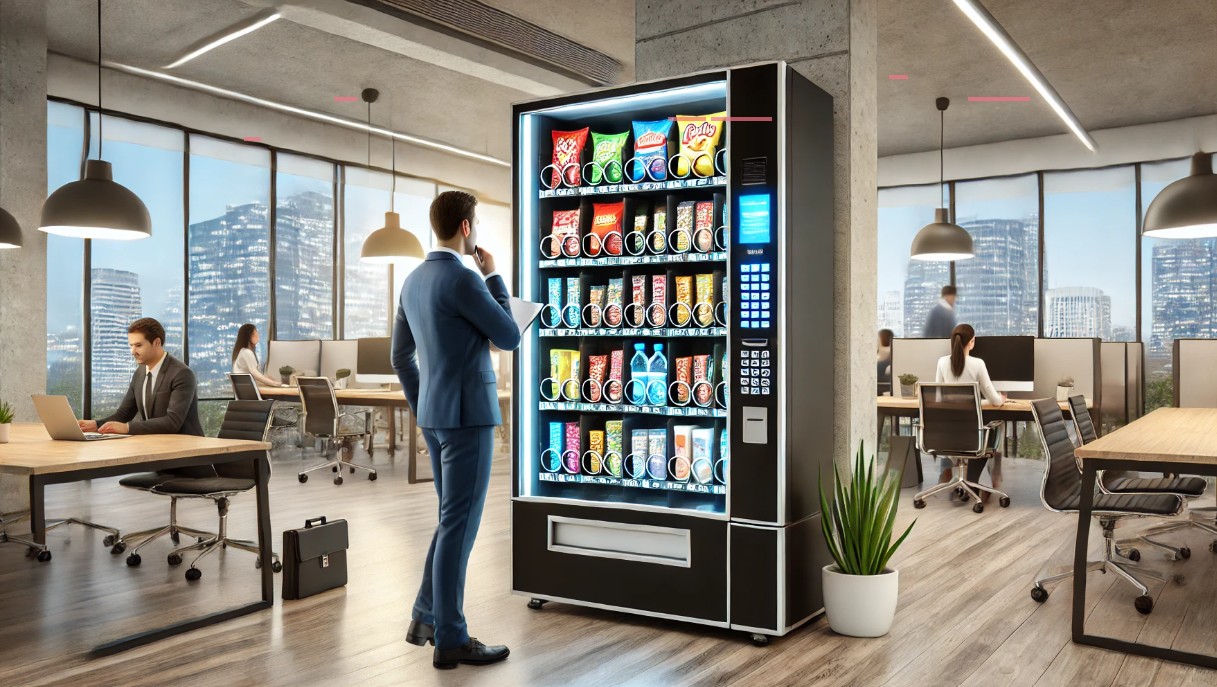Table of Contents
ToggleThe UK vending machine industry is experiencing significant growth, with vending machines selling over 6 billion items annually, according to the Automatic Vending Association (AVA). With the demand for quick, on-the-go food and beverages rising, vending businesses are becoming a lucrative and low-maintenance investment.
The beauty of a vending machine business is its low overhead costs, passive income potential, and scalability. Whether you start with one machine or ten, a well-placed vending machine can generate consistent profits with minimal daily effort.
If you’re wondering how to start a vending machine business in the UK, this guide will walk you through every step, from choosing the right machines to finding profitable locations and exploring franchise opportunities.
What Is the Vending Machine Industry Like in the UK?
The UK vending machine industry is valued at over £25 billion, with strong growth expected through 2028. The increase in contactless payments, demand for healthy snacks, and the rise of specialty vending have created new opportunities for vending entrepreneurs.
What Are the Most Popular Vending Machine Types in the UK?

Vending machines are not just for snacks and drinks anymore. They now offer a wide range of products, from hot meals and fresh coffee to phone accessories and PPE.
- Snack & Drink Machines: Sell crisps, chocolates, soft drinks, and bottled water.
- Coffee Vending Machines: Dispense fresh coffee, tea, and hot chocolate, ideal for offices and hospitals.
- Healthy Vending Machines: Provide organic snacks, protein bars, sugar-free drinks, and gluten-free options.
- Specialty Vending Machines: Sell PPE, fresh flowers, tech gadgets, books, beauty products, and even umbrellas.
Did You Know? Coffee vending machines alone contribute over £2 billion annually to the UK economy!
Is a Vending Machine Business Profitable in the UK?
A vending machine business in the UK can be profitable, but several factors influence earnings, including location, product selection, and maintenance.
Revenue Potential
The amount a vending machine earns depends on its placement. Machines in high-traffic areas can generate significantly higher revenue than those in low-footfall locations.
| Location Type | Estimated Monthly Earnings (£) |
| Office buildings | 150 – 500 |
| Hospitals | 500 – 1,500 |
| Train stations | 800 – 2,000 |
| Gyms | 200 – 700 |
| Shopping centres | 1,000 – 3,000+ |
A well-placed vending machine can generate between 300 and 1,500 per month, while machines in premium locations like airports and train stations can earn significantly more.
Profit Margins
Profit margins for vending machines typically range between 20% and 50%, depending on the type of products sold and supplier costs.
- Snacks and drinks generally offer profit margins of around 40%.
- Healthy food and premium products may have lower margins but higher demand in certain locations.
- Specialty vending machines, such as coffee or tech accessory machines, can have margins exceeding 50%.
Key Factors Affecting Profitability
- Location: Machines placed in high-footfall areas generate more revenue.
- Product Selection: Stocking best-selling items ensures consistent sales.
- Payment Methods: Cashless vending increases purchases by 30% or more.
- Maintenance and Servicing: Regular servicing prevents breakdowns and loss of sales.
By carefully selecting the right locations and products, vending machine operators can achieve a stable and profitable business.
How Can You Start a Vending Machine Business in the UK?
Starting a vending machine business requires careful planning and a step-by-step approach.
Step 1: Research the Market and Decide on a Business Model

Before purchasing vending machines, research the UK vending industry to determine the most suitable approach for your business.
Independent vs. Franchise Vending Machines
- Independent vending machines allow full control over products, locations, and pricing but require more effort in securing machine placements and managing logistics.
- Franchising provides access to an established brand, existing locations, and operational support but requires a franchise fee and limits business flexibility.
Choosing a Target Audience
Different locations require different vending products. Offices and gyms demand healthy snacks, while train stations and hospitals require drinks and quick bites.
Understanding Competitor Presence
Identify existing vending machines in your preferred location. If the market is saturated, it may be difficult to generate significant revenue without offering unique products.
Step 2: Choose the Right Vending Machines
The type of vending machine you choose will depend on your business goals and target market.
Types of Vending Machines and Costs
| Vending Machine Type | Average Cost (£) |
| Snack & Drink Combo | 2,500 – 5,000 |
| Coffee Vending Machine | 3,000 – 6,000 |
| Healthy Food Machine | 3,500 – 6,500 |
| Second-Hand Machine | 800 – 2,500 |
Starting with one or two machines allows business owners to test the market before expanding.
Step 3: Secure the Best Locations
Location is one of the most important factors in a vending machine business. High-traffic areas generate the most sales, while poor placement can result in low revenue.
Best Locations for Vending Machines in the UK
- Shopping Centres & Retail Parks: Benefit from impulse purchases.
- Hospitals & Healthcare Facilities: Staff and visitors provide a steady customer base.
- Office Buildings: Employees frequently purchase drinks and snacks.
- Transport Hubs (Train Stations, Airports, Bus Stops): Travellers look for convenience and quick refreshments.
Once a location is selected, business owners must negotiate placement terms, either by paying rent or agreeing to a profit-sharing model with the property owner.
Step 4: Purchase and Stock Your Vending Machines
After securing locations, vending machines need to be stocked with the right products.
Popular Vending Machine Products in the UK
- Soft drinks, bottled water, and energy drinks
- Snacks like crisps, chocolate bars, and nuts
- Healthy options such as protein bars and sugar-free drinks
- Coffee and hot beverages in high-demand locations
Step 5: Understand Licensing and Legal Requirements
Operating a vending machine business in the UK requires compliance with legal regulations.
Key Legal Requirements
- Business Registration: Register as a sole trader or limited company.
- Food Hygiene Regulations: If selling perishable items, follow UK food safety laws.
- Machine Placement Agreements: Secure written agreements with location owners.
- Consumer Protection Compliance: Ensure correct pricing and allergen information.
Some vending machines, such as those selling alcohol or cigarettes, require additional licences.
Step 6: Maintain and Manage Your Vending Machines

Regular maintenance is essential to keep machines running smoothly.
Routine Servicing Checklist
- Refill stock weekly to prevent empty shelves.
- Clean machines regularly for hygiene and proper functioning.
- Check payment systems to ensure cash and card readers are working.
- Analyse sales data to adjust inventory and optimise profits.
What Are the Best Vending Franchise Opportunities in the UK?
For entrepreneurs looking for an easier entry into the vending industry, buying into a vending machine franchise can provide several advantages. A franchise opportunity typically offers pre-existing brand recognition, training, and operational support, making it an attractive option for those who want to avoid the challenges of setting up an independent business.
Top Vending Franchise Opportunities in the UK
Several vending franchises are available in the UK, ranging from snack vending to mobile food and coffee services. Here are some of the leading options:
| Franchise | Industry | Expected Revenue After 2 Years | Funding Support | Outlets Available |
| Chapati Man | Fast food vending | N/A | N/A | UK-wide |
| Charge Point | Mobile phone charging | N/A | N/A | UK-wide |
| Coffee Blue | Mobile coffee service | N/A | N/A | UK-wide |
| Coffee-Bike | Coffee vending | Up to £16,000/month | Yes | UK-wide |
| Really Awesome Coffee | Mobile café service | N/A | N/A | UK-wide |
| Snack Aid | Charity snack vending | N/A | N/A | UK-wide |
| Snack In The Box Ltd | Snack & drink vending | N/A | N/A | UK-wide |
| Sweets and Treats Vending | Confectionery vending | N/A | N/A | UK-wide |
| Tubz Vending | Confectionery & novelty vending | N/A | Third-party | UK-wide |
A vending machine franchise can provide a head start in the industry by reducing risks associated with sourcing products, securing locations, and setting up payment systems.
How Much Does It Cost to Start a Vending Machine Business?
Starting a vending machine business in the UK requires both initial investment and ongoing operational costs. The total cost depends on factors such as the type of machine, location rent, inventory, and maintenance.
Types of Vending Machine Business Costs

The costs associated with starting a vending business can be divided into two categories:
1. Capital Costs (One-Time Investment)
These are the upfront expenses required to set up the business.
- Vending Machine Purchase: New machines cost between £1,200 and £15,000, while second-hand machines range from £50 to £3,000.
- Machine Financing: Some businesses choose to finance vending machines through loans or leasing agreements.
- Business Registration: Setting up as a sole trader or limited company can cost between £12 and £50.
- Payment System Upgrades: Modern vending machines need contactless payment options, which may cost £200 – £500 per machine.
2. Operating Costs (Ongoing Expenses)
These are the monthly costs of running the business.
- Location Rent: Some property owners charge a fixed monthly fee (£50 – £500), while others take a percentage of sales.
- Stock and Inventory: The cost of replenishing vending stock depends on the type of products sold. Initial stock purchases range from £200 – £1,000.
- Electricity Costs: Machines that require refrigeration or heating incur monthly electricity expenses (some landlords include this in rent).
- Maintenance and Repairs: Regular servicing and repairs cost around £50 – £200 per month.
- Insurance: Business and equipment insurance are necessary to cover theft, vandalism, or liability claims. Public liability insurance costs around £100 – £300 per year.
- Taxes and Permits: Some cities require vending machine operators to pay local taxes or obtain permits.
Estimated Startup Costs for a Vending Machine Business in the UK
| Expense Category | Estimated Cost (£) |
| Vending machine purchase | 1,200 – 15,000 |
| Stock & inventory | 200 – 1,000 |
| Location rent (if applicable) | 50 – 500/month |
| Maintenance & servicing | 50 – 200/month |
| Business registration | 12 – 50 |
| Insurance | 100 – 300/year |
| Payment system upgrades | 200 – 500 |
| Total Startup Cost | 2,000 – 20,000+ |
How Long Does It Take to Break Even?

A vending machine typically delivers a 20% – 25% net profit margin. Based on an average £300 profit per month per machine, a small business with 10 machines could generate £3,000 – £6,000 per month, leading to £36,000 – £72,000 annual earnings.
Most vending business owners recoup their initial investment within 6 to 18 months, depending on the number of machines and their locations.
How to Reduce Startup Costs?
- Buy Second-Hand Machines: Used machines can be 50% cheaper than new ones.
- Start with Fewer Machines: Begin with one or two machines and scale up based on demand.
- Negotiate Location Rent: Some landlords allow profit-sharing agreements instead of fixed rent.
- Choose Low-Maintenance Products: Non-perishable snacks reduce stock spoilage and waste.
Conclusion
Starting a vending machine business in the UK can be a profitable and scalable venture with the right strategy. By selecting high-traffic locations, choosing the right vending machines, and maintaining stock levels, entrepreneurs can build a steady stream of passive income.
The initial investment ranges from £2,000 to £20,000, depending on whether you purchase new or used machines, opt for an independent business or a franchise, and factor in operational costs such as rent, stock, and maintenance.
Vending machine businesses require low overhead costs and minimal staff, making them an excellent opportunity for both part-time and full-time entrepreneurs. With careful planning, proper maintenance, and market research, a vending machine business can break even within 6 to 18 months and generate long-term profitability.
FAQs About Starting a Vending Machine Business in the UK
How much can you earn from a vending machine in the UK?
Earnings vary based on location and product selection. A well-placed vending machine can generate between £300 and £1,500 per month, while machines in high-traffic areas like shopping centres or train stations can earn significantly more.
Do you need a licence to operate a vending machine in the UK?
Most vending machines do not require a licence, but you may need food hygiene certification if selling perishable items. Some cities may also require permits or business registration.
What are the best locations for vending machines?
The most profitable locations include shopping centres, hospitals, office buildings, gyms, and transport hubs. High-footfall areas lead to higher sales and better profits.
How much does it cost to start a vending machine business?
The startup cost ranges from £2,000 to £20,000, depending on the type of machine, stock, location rent, and maintenance costs. Buying second-hand machines can reduce initial expenses.
Is it better to start independently or buy a vending franchise?
It depends on your business goals. Independent vending businesses offer more flexibility but require more effort in securing locations and stock. A vending franchise provides brand recognition and support but often comes with higher initial costs and restrictions.




